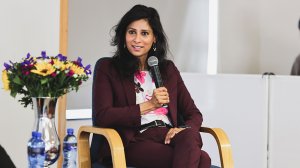With tough global economic financial conditions and the rising needs and development priorities that South Africa has, government must better manage its fiscal situation, as well as address its structural issues to ensure the country can be placed on a sustainable growth and debt path.
This was the key message conveyed by International Monetary Fund (IMF) first deputy MD Gita Gopinath, during a speaking engagement at the University of the Witwatersrand School of Economics and Finance on August 31.
Gopinath pointed out that the IMF provides financing to help offset tight financing situations, as well as assists governments with improving fiscal situations through better planning. It also offers advice and technical assistance on revenue and expenditure.
To improve South Africa’s growth path, with IMF projections showing near-zero growth for the country this year, as well as minimal growth over the medium term, Gopinath averred that the IMF had suggested two areas of focus.
Its first recommendation is on the fiscal side.
Gopinath said the IMF was projecting the share of South Africa’s revenue going to interest would increase from about 17% this year to 27% in 2028, and, therefore, it was recommending strengthening fiscal consolidation in the country.
She pointed out that the South African government had done well coming out of the pandemic, when the economy was recovering strongly, to reduce its fiscal deficits.
However, looking ahead, Gopinath emphasised that the country needed greater fiscal consolidation as IMF predictions showed fiscal deficits of about 6%.
One of the means to do this would be to prioritise which State-owned enterprises (SOEs) required funding, as considerable funds were currently being used to assist SOEs. The country also had to fix its wage bill.
Gopinath pointed out that revenues were also decreasing, owing to slower growth and with commodity prices not expected to reach the high levels experienced during the peak of the energy crisis that resulted from the Russia-Ukraine situation.
She emphasised, therefore, that it was critical to fix the country’s energy crisis, as this had an impact on gross domestic product growth.
Secondly, Gopinath said the country needed to undertake structural reform and address structural issues.
She pointed out that SOEs such as Eskom and Transnet were critical and that it was, therefore, imperative to improve these entities’ operational performance and their financial viability, both of which require considerable work.
Moreover, Gopinath posited that the government’s role in, and support of, other SOEs needed to be reconsidered, with the potential for increased private sector participation, including in, for example, electricity generation.
She highlighted that the IMF saw the importance of the private sector playing a greater role in many SOEs. It considered the footprint of SOEs in the country to be too large.
EMAIL THIS ARTICLE SAVE THIS ARTICLE ARTICLE ENQUIRY
To subscribe email subscriptions@creamermedia.co.za or click here
To advertise email advertising@creamermedia.co.za or click here










